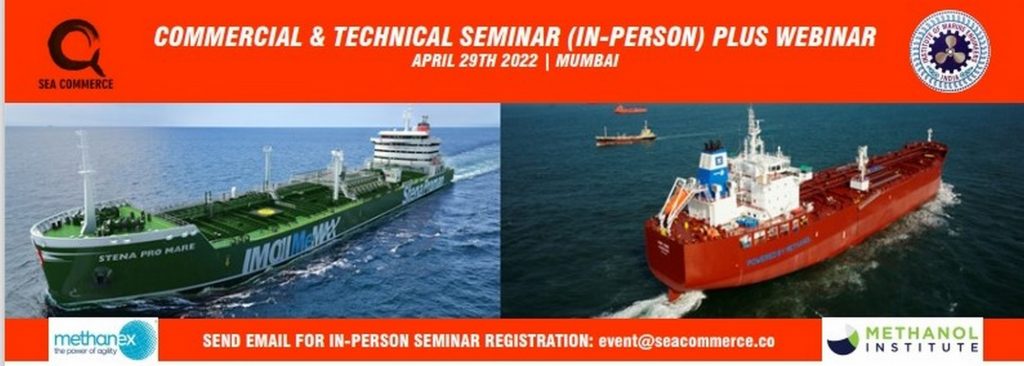A seminar was organised by Sea Commerce Consulting and Institute of Marine Engineers of India (IMEI) with support from FedCom, Methanex Corporation, Methanol Institute, along with the classification societies ABS and IRS on April 29, 2022 at Banquet Hall MCA, at Bandra in Mumbai. It was a hybrid event conducted with title “The rise of methanol as future proof fuel”. Future Fuels has acted as Media Partner for the event.
The event was participated by more than 225 members both in person and through online. The event was moderated by Richard Clayton, Chief Correspondent Lloyds List, London.
Captain Saleem Alavi, Sea Commerce Consulting’s president and organiser of the seminar series realised there was a lack of awareness in the maritime industry regarding methanol as a useful marine fuel. This is despite the fuel being used in at least eight large vessels with four more on order, all on international trades.
“Methanol processed using natural gas as a feedstock has a similar emissions profile as liquid natural gas but does not need storing in cryogenic tanks like LNG”, said Captain Alavi. He also pointed to custody transfers for bunker suppliers being much easier for methanol versus LNG, the methanol being more readily available globally, as well as the ease of handling in the supply chain.
Methanol is already an industrial feedstock with a mature supply chain infrastructure, which would make the development of a bunker supply for shipping much easier than for LNG, which has been singled out by critics for the difficulties in developing a suitable bunker supply network and the need to build dedicated bunker vessels.
Vijay Arora, Managing Director, IRS Mumbai, India, has given the initial presentation. He has mentioned that methanol is not a new fuel, in fact, it was introduced earlier as alternative fuel to fossil fuels in 1969-70. But later on, not much importance was given to it. He has elaborately presented the types of methanol like grey methanol, blue methanol, and green methanol, etc and their difference. He has also presented what safety aspects need to be taken into consideration for methanol to be future proof fuel.
Ayca Yalcin, Director, Marketing Development, EMEA, Methanex. Belgium, highlighted the low environmental footprint of methanol and the attractive capital and operational costs. The fuel has a relatively low cost compared with gas oil and can be stored through the easy conversion of existing bunker tanks. According to Methanex vice president Global Market Development Ben Iosefa, the price of methanol in India in terms of energy value has been approximately 20 per cent cheaper than marine gas oil (MGO) and with future expectations of higher MGO prices, this cost benefit is likely to be significantly higher following the introduction of the new IMO 2020 sulphur regulations.
Mark Penfold, manager at ABS Global Gas Solutions, highlighted how well positioned methanol is as a suitable solution. However, he was amongst the experts that said methanol as a fuel has been behind LNG in terms of regulatory development and public awareness.
Cdr Sandeep Kumar (Retd.), surveyor with the Indian Register of Shipping in Mumbai summarised the seminar with an overview of the advantages and challenges of using methanol as marine fuel. He emphasised the need for adequate risk assessment, based on a 2014 report from the European Maritime Safety Agency.
“It is important that shipowners and other key industry players such as those in finance, insurance and ship design understand the range of possibilities as they look to find answers to the tough questions facing global shipping between 2020 and 2050, answers that will undoubtedly call for new fuel solutions”.
Capt Alavi said: “We are planning more of these seminars in key maritime areas during 2019 in a bid to raise awareness of the fuel and to create a robust debate about the alternatives available for commercial shipping.
Captain Alavi concluded: “It takes a number of pieces of the puzzle to be in place, such as regulatory framework, engine technologies and bunkering infrastructure for the take up of alternative fuels to begin and with that goes a need for early adopters and greater public awareness.”
Tags: Fuel, IMEI, LNG, Methanol, Sea Commerce, Seminar



Recent Posts
Seafarer Wellbeing Highlighted in New Decarbonisation Guidance from ISWAN
India Outlines Green Hydrogen Strategy at World Hydrogen Summit 2025 in Rotterdam
Port of Rotterdam and EDGE Navigation Partner to Advance Liquid Hydrogen Infrastructure
Finnlines Launches Low-Carbon “Green Lane” Sea Transport Service with Up to 90% Emission Cuts
Microsoft Teams Up with NORDEN to Cut Maritime Supply Chain Emissions
Höegh Autoliners’ Fifth Aurora-Class PCTC Enters Service with Multi-Fuel Capability
Next-Gen Marine Propulsion: MAN Launches Methanol Super Engine
Port of Amsterdam Marks First Ship-to-Ship Methanol Bunkering